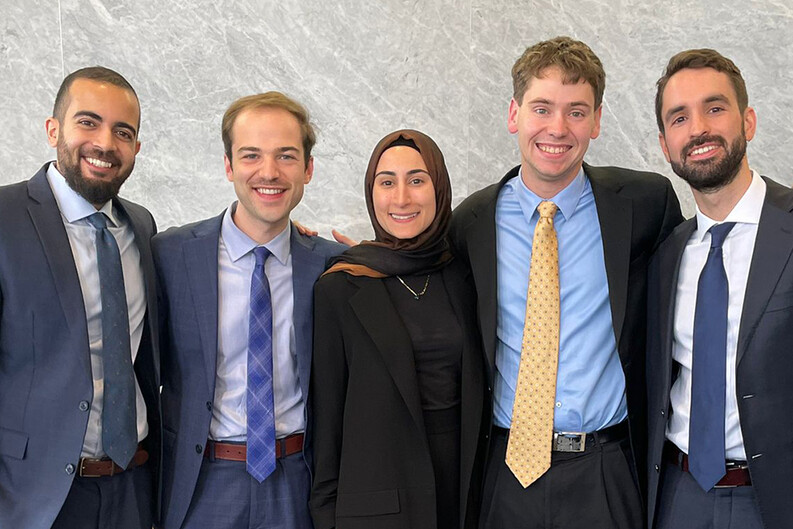Yale Law School Team Wins Northeast Moot Court Title, Heads to Internationals

A team from Yale Law School will advance to the international rounds of the world’s largest moot court competition after defeating the reigning world champions in U.S. finals this month.
Yale’s team is now the Northeast U.S. winner in the Philip C. Jessup International Law Moot Court Competition after beating Harvard Law School on March 12 in New York. Earlier that weekend, the team defeated the University at Buffalo School of Law in the quarterfinals and Columbia Law School in the semifinal round.
“It was an incredible feeling,” said Justin Cole ’23, a member of the team. “We had faced a lot of great teams all weekend, but we obviously knew that Harvard was among the best of the best. But once the argument started, any background thinking went away, and we were just thinking about how to best present our arguments.”
Alaa Hachem ’24, another team member, called the round “one of the team’s best,” and added that the Harvard match had a hot bench — one in which the judges question the team — “which made it a fun round.”
The competition, known as the Jessup, is a simulation of a fictional dispute between countries before the International Court of Justice, the judicial organ of the United Nations. Teams prepare oral and written pleadings arguing both the applicant and respondent positions of the case.
“The whole team and I certainly had a strong understanding of international law, but it is totally different to respond live to questions from judges and figure out how to respond to teams who make unique and interesting arguments,” Cole said. “In that sense, it was really good practice for oral advocacy; it was really valuable to see how things we learned in the classroom might play out in something more closely resembling actual practice.”
In addition to Cole and Hachem, Yale Law School’s team includes Ali Hakim ’24, Thomas Poston ’24, and Matei Alexianu ’23. The team is coached by Beatrice Walton ’18, who practices international law and has served as an assistant to the Special Rapporteur on Crimes Against Humanity at the U.N. International Law Commission.
Along with Walton, Hachem credited several people with helping the team prepare for the competition and work through its arguments: Sterling Professor of Law Harold Hongju Koh, Gerard C. and Bernice Latrobe Smith Professor of International Law Oona A. Hathaway ’97, and Associate Director for Foreign and International Law and Lecturer in Legal Research Lucie Olejnikova, and Visiting Lecturer in Law Ian Park.
“Our performance in the final was the culmination of months of research, writing, and practice,” Hakim said. “Seeing all that hard work pay off was incredibly rewarding.”
The international rounds take place April 8 in Washington, D.C. The winning team will compete to become the world champion the following week.
Organized by the International Law Students Association, the Jessup competition is the world’s largest moot court competition, with participants from roughly 700 law schools in 100 countries and jurisdictions.


